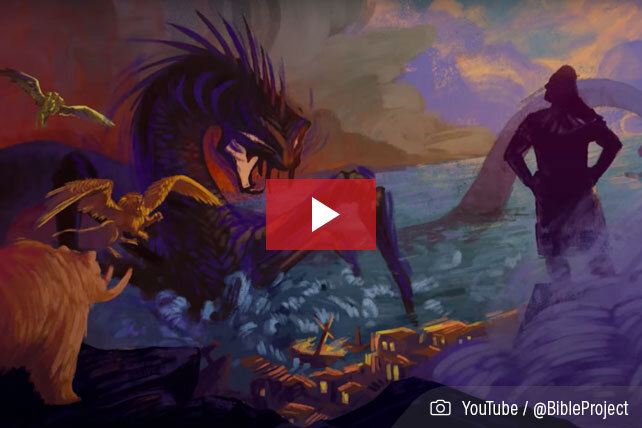The insanity of the world has gotten many people thinking about the end of the world, which is often referred to as the Apocalypse. The Bible’s primary book on this topic, Revelation, is…confusing to say the least. Thankfully, as part of their “How to Read the Bible” series, the BibleProject has created a short video to help people know how to approach the Book of Revelation and other passages of apocalyptic literature in the Bible.
“The moon turns to blood, mountains crumble, mutant locusts swarm. These are just some of the strange images we find in parts of the Bible called ‘apocalyptic,’” says the BibleProject. Other striking imagery from Revelation includes beasts that come out of the sea, the famous “mark of the beast,” and the so-called “four horsemen of the Apocalypse.”
The word “apocalypse” has become synonymous with “the end of the world,” which is not surprising given that Revelation does describe the end of the world. However, the actual meaning of the word “apocalypse” is to “reveal” or “uncover.” Says the BibleProject, “An apocalypse is when you suddenly see the true nature of something that you couldn’t see before.” There are examples of apocalyptic literature outside of the Bible, but “in the Bible, an apocalypse is when God pulls back the curtain to show someone what’s really going on in the world from a divine perspective.”
Apocalyptic Literature in the Bible
Scripture includes sections of apocalyptic literature apart from Revelation, as well as examples of people experiencing “mini-apocalypses,” or individual divine revelations. Isaiah 6 recounts an example of the latter when it describes the prophet Isaiah seeing a heavenly vision of God seated on his throne. Another example of a divine revelation is when Jesus appears to Saul (later known as the Apostle Paul) on the road to Damascus. God blinds Saul physically, but reveals the spiritual truth that Saul is opposing God by persecuting the church. “These apocalypses give people a heavenly perspective on their earthly situation,” says the BibleProject. “And they can give hope, or they can challenge you.”
Then there are sections of the Bible filled with “extended apocalyptic dreams and visions,” such as John’s vision in Revelation, the vision of the valley of dry bones in Ezekiel 37, and the various visions of Daniel.
When trying to understand and interpret such passages, says the BibleProject, it is crucial to remember that “apocalyptic literature is written in a poetic, imaginative style, and it’s packed with symbolism.” Sometimes the author tells us exactly what a symbol represents, as in Daniel 7:17, but usually we are left to discern the meaning of the symbols ourselves by studying the entirety of God’s Word. When we take the time to do so, we can see that Scripture presents various “design patterns,” or repeated imagery woven throughout its narrative.
For example, the “cosmic destruction and violence” that we see in Revelation hearkens back to other biblical accounts of God’s judgment, such as the flood, the 10 plagues, and the exile to Babylon.
Another repeated image is that of the sea. Genesis 1 tells us that before God brought order and light to the world, there was darkness, chaos and water. The idea of the sea being associated with chaos is developed throughout the Bible, and Revelation 21:1 tells us that when God creates the new heaven and the new earth, there will no longer be any sea.
We also see the theme of substitutionary atonement culminate in Revelation when John sees Jesus depicted as a slain lamb on a throne. And it is the revelation of Jesus’ final triumph over sin and death that is the most important point of the book. Says the BibleProject, “While the Revelation feels like the end of the world, it’s actually about the beginning of the renewed world, where heaven and earth are reunited and God’s human images rule all creation in the love and power of God.”
To be fair, apocalyptic literature in general and the Book of Revelation in particular are challenging to understand. But their purpose, says the BibleProject, “is really clear: To give us a heavenly perspective on our earthly circumstances so that every generation of God’s people can be challenged, comforted, and given hope for the future.”

